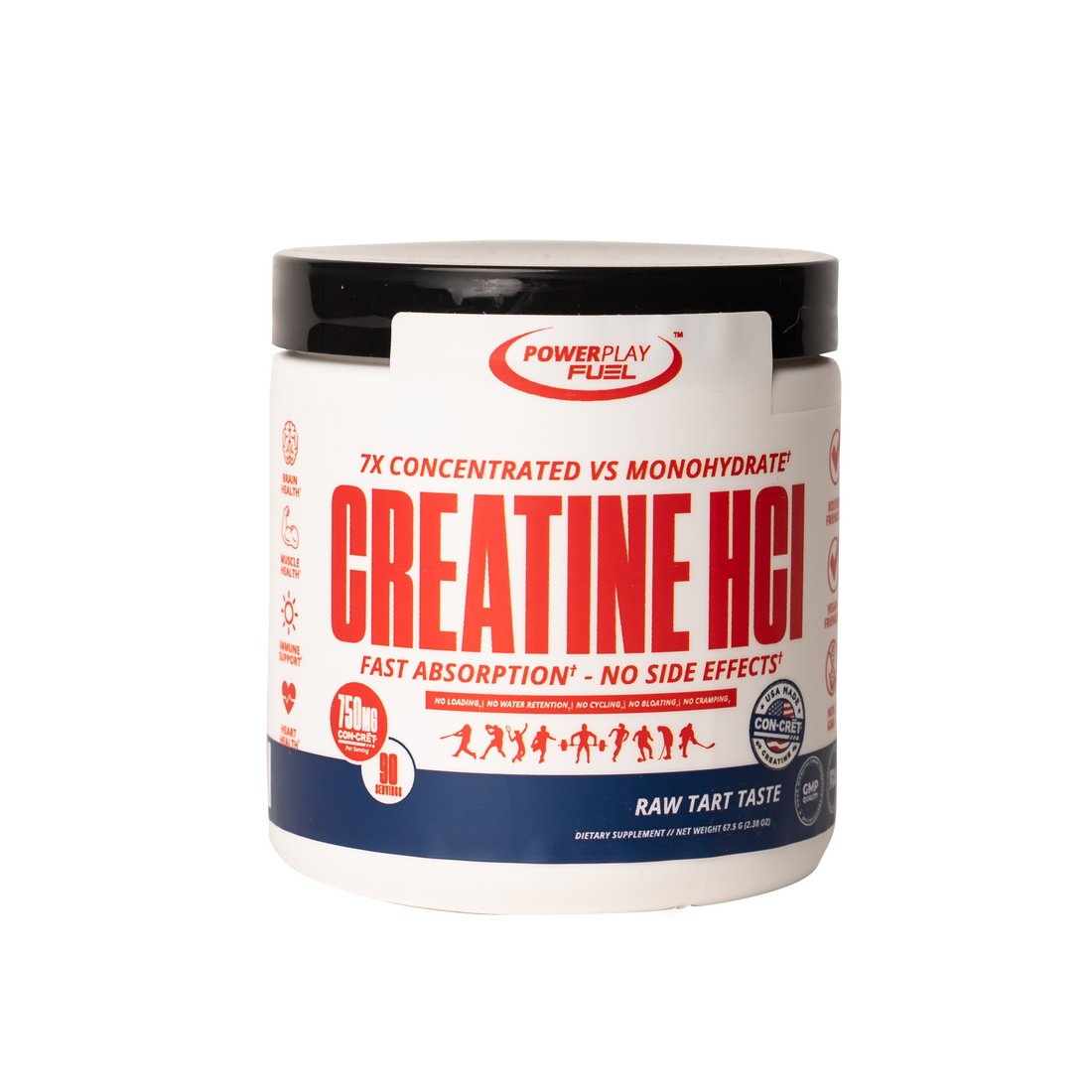
What does HCl do in creatine?
In the fitness world, creatine HCl is gaining attention. It's known for better absorption and effects. This form of creatine combines with hydrochloric acid, making it more soluble in water.
This combination helps creatine HCl break down faster in the body. Muscle cells can then absorb it more easily. This leads to less water retention and bloating, common issues with other creatine types.
With its high solubility, creatine HCl is a great choice for those looking to build muscle and boost strength. It offers these benefits without the discomfort often seen with other supplements.
Key Takeaways
- Creatine HCl is bound with hydrochloric acid, greatly improving its solubility.
- Enhanced solubility leads to quicker and more effective absorption by muscle cells.
- The superior absorption rate potentially reduces common creatine side effects, such as bloating and water retention.
- Because of its efficient absorption, creatine HCl might require lower dosages compared to creatine monohydrate.
- Creatine HCl supports rapid ATP regeneration, which is key during intense workouts.
- It is a good choice for athletes and gym-goers wanting creatine's benefits without bulkiness.
Understanding Creatine: Forms and Functions
Creatine is a top choice in fitness supplements, known for boosting muscle growth and ATP production. It's a natural amino acid our bodies make. It's key for energy during intense activities. Different forms, like creatine monohydrate and HCl, offer unique benefits.
Introduction to Creatine and Its Importance in Fitness
Creatine helps with quick energy and muscle endurance, vital for athletes. It helps recharge ATP, keeping energy up during workouts. Creatine HCl is popular for its fast solubility and absorption, helping avoid digestive problems.
Comparing Creatine HCl with Monohydrate
| Feature | Creatine HCl | Creatine Monohydrate |
|---|---|---|
| Solubility | High | Low |
| Absorption Rate | Fast | Variable |
| Typical Dosing | Lower doses required | Higher doses often required |
| Common Side Effects | Reduced bloating and gastrointestinal discomfort | Potential bloating and gastrointestinal discomfort |
Creatine HCl's high solubility means faster absorption, needing smaller doses and less stomach upset. Both forms boost muscle and performance, but HCl might be better for some due to its benefits.
The Biochemistry of Creatine in the Body
In our bodies, creatine helps make phosphocreatine, which refuels ATP during hard exercise. This is key for muscle strength and recovery. Creatine HCl is great for quick energy, helping muscles grow and perform better.
Also, research shows creatine might help with brain health. This adds to its benefits in sports and health.
What does HCl do in creatine
Hydrochloric acid makes creatine HCl more stable and soluble. This makes it a top HCl supplement for creatine. It boosts creatine HCl absorption, helping muscles take it in quickly. This is key for those looking for fast and effective results.
Creatine HCl benefits include faster absorption and smaller doses. The hydrochloric acid makes it dissolve better in water. This means the body can process it more easily. It also cuts down on side effects like bloating and water retention.
This makes creatine HCl great for athletes and bodybuilders. They can boost their muscle strength and size without feeling uncomfortable.
| Creatine Form | Absorption Rate | Common Side Effects | Recommended Dose |
|---|---|---|---|
| Creatine Monohydrate | Slower | Water retention, bloating | 3-5g daily |
| Creatine HCl | Faster | Minimal | 1-2g daily |
In summary, creatine HCl supports quick muscle recovery and growth. It also reduces side effects, making it a great choice for better performance with comfort. It's perfect for those sensitive to traditional creatine, providing a more efficient way to benefit from it.
Conclusion
Creatine supplements are key for improving fitness and muscle growth. The debate on creatine HCl and monohydrate forms continues. Each has its own benefits.
Creatine HCl stands out for its better solubility. This means it's absorbed faster into the blood. It might also reduce stomach side effects seen with other forms.
Even though HCl is popular, creatine monohydrate is well-studied and affordable. The choice between them depends on personal needs and goals. Some prefer HCl for its solubility and speed, while others choose monohydrate for its proven results and cost.
It's important to choose high-quality, tested supplements. Always talk to a healthcare professional before starting any new supplement. This helps pick the right supplement for your health and fitness goals.
If you are looking for the best most natural Creatine HCl you can buy online Power Play Fuel has the best Creatine HCl in stock and ready to ship.
FAQ
What does HCl do in creatine?
Hydrochloric acid (HCl) in creatine, known as creatine HCl, makes it more soluble and easier to absorb. This form dissolves faster and gets absorbed by muscles quicker than creatine monohydrate. It might also reduce side effects like water retention and stomach discomfort.
How does creatine HCl differ from creatine monohydrate?
Creatine HCl is more soluble and absorbs better than creatine monohydrate. It doesn't need a loading phase and you can take smaller doses. This can lead to fewer side effects, like bloating and stomach issues, compared to monohydrate.
What are the benefits of taking creatine HCl?
Creatine HCl boosts exercise performance and muscle recovery. It increases muscle mass and strength. It might also lower body fat and improve brain function. Its high solubility means quicker absorption with fewer side effects.
Is creatine HCl better than creatine monohydrate?
Whether creatine HCl is better than monohydrate depends on personal needs. Creatine HCl absorbs better and might be better for those with monohydrate side effects. But monohydrate is proven and cheaper. People choose based on what works best for them.
How does creatine support energy metabolism within muscle cells?
Creatine boosts energy by increasing phosphocreatine in muscles. Phosphocreatine helps recharge ATP, the energy source, during intense activities. More creatine means less fatigue, better performance, and faster energy recovery.
Can creatine HCl cause water retention or bloating?
Creatine HCl might cause less water retention and bloating than monohydrate. Its high solubility and quick absorption lead to fewer stomach issues and less puffiness.
Do I need to load creatine HCl?
No, you don't need to load creatine HCl. Its better absorption means smaller doses are enough, unlike monohydrate which often requires a loading phase.
How does creatine affect cognitive and neurological health?
Creatine might improve brain health and cognitive function. It could help with certain brain disorders. More research is needed to confirm these benefits.
What should I consider before starting creatine HCl supplementation?
Before starting creatine HCl, choose a high-quality, third-party tested product. Talk to a healthcare provider to make sure it's safe for you, considering your health and fitness goals.
